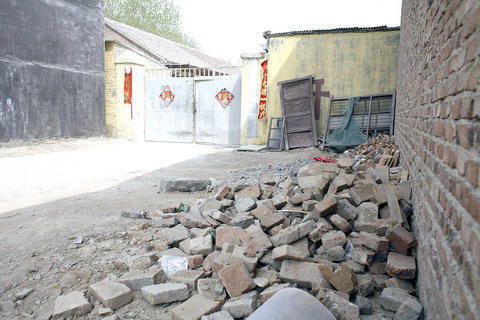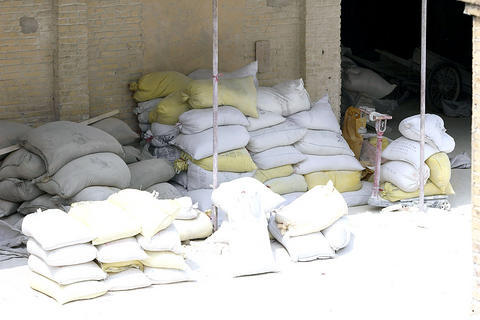A Chinese company accused of selling contaminated wheat gluten to US pet food suppliers avoided inspections partly because it did not correctly disclose its shipping contents to Chinese export authorities, according to US regulators.
The Xuzhou Anying Biologic Technology Development Co, one of two Chinese companies at the center of the huge recall of pet food that has killed or sickened thousands of animals, shipped more than 635 tonnes of wheat gluten labeled as nonfood products this year through a third-party Chinese textile company.
By listing the goods as nonfood items, the firm's shipments were not subject to mandatory inspection by the Chinese government.

PHOTO: NY TIMES NEWS SERVICE
Though a possible violation of Beijing's export policies, such mislabeling is thought to be widespread in China.
The details of the case, some of them disclosed on Friday in a circular released by the US Food and Drug Administration (FDA), are just the latest clues that Chinese feed suppliers may have been intentionally disguising the contents of their goods.
Several FDA officials are now visiting China to seek more information about how and why an industrial chemical used in plastics and fertilizer got mixed into pet food ingredients.

PHOTO: NY TIMES NEWS SERVICE
US regulators admit that six weeks after one of the biggest pet food recalls in US history, they still do not know exactly who in China manufactured the contaminated pet food ingredients or where in China the contamination took place.
Though the agency has named two Chinese companies as the suppliers of the tainted vegetable protein sent to the US, regulators suspect the companies may not have been manufacturing the feed, but buying it from dozens of other feed manufacturers in China.
Those feed producers, regulators say they believe, may have intentionally mixed melamine into the feed to inflate artificially the level of protein in the bags to meet pet food requirements.
The two Chinese companies named by US regulators last month have said little publicly since the recall.
Both companies are based in eastern China, near one of the country's biggest wheat-growing regions and also one of the centers of melamine production.
Melamine is an industrial chemical that animal feed producers here say has been intentionally mixed into feed to trick farmers into thinking they are buying higher protein meal, even though the chemical has no nutritional value.
The Chinese government said last week that it was unlikely melamine could have harmed so many pets in the US.
But on Friday, China banned melamine from use in any vegetable protein for export or for use in the domestic food market.
The FDA says that it has received reports that more than 4,000 cats and dogs died as a result of eating pet food that may have been laced with melamine.
Scientists are now struggling to determine why melamine, a chemical that is not believed to be toxic, may have turned poisonous.

NATIONAL SECURITY THREAT: An official said that Guan Guan’s comments had gone beyond the threshold of free speech, as she advocated for the destruction of the ROC China-born media influencer Guan Guan’s (關關) residency permit has been revoked for repeatedly posting pro-China content that threatens national security, the National Immigration Agency said yesterday. Guan Guan has said many controversial things in her videos posted to Douyin (抖音), including “the red flag will soon be painted all over Taiwan” and “Taiwan is an inseparable part of China,” while expressing hope for expedited “reunification.” The agency received multiple reports alleging that Guan Guan had advocated for armed reunification last year. After investigating, the agency last month issued a notice requiring her to appear and account for her actions. Guan Guan appeared as required,

A strong cold air mass is expected to arrive tonight, bringing a change in weather and a drop in temperature, the Central Weather Administration (CWA) said. The coldest time would be early on Thursday morning, with temperatures in some areas dipping as low as 8°C, it said. Daytime highs yesterday were 22°C to 24°C in northern and eastern Taiwan, and about 25°C to 28°C in the central and southern regions, it said. However, nighttime lows would dip to about 15°C to 16°C in central and northern Taiwan as well as the northeast, and 17°C to 19°C elsewhere, it said. Tropical Storm Nokaen, currently

PAPERS, PLEASE: The gang exploited the high value of the passports, selling them at inflated prices to Chinese buyers, who would treat them as ‘invisibility cloaks’ The Yilan District Court has handed four members of a syndicate prison terms ranging from one year and two months to two years and two months for their involvement in a scheme to purchase Taiwanese passports and resell them abroad at a massive markup. A Chinese human smuggling syndicate purchased Taiwanese passports through local criminal networks, exploiting the passports’ visa-free travel privileges to turn a profit of more than 20 times the original price, the court said. Such criminal organizations enable people to impersonate Taiwanese when entering and exiting Taiwan and other countries, undermining social order and the credibility of the nation’s

‘SALAMI-SLICING’: Beijing’s ‘gray zone’ tactics around the Pratas Islands have been slowly intensifying, with the PLA testing Taiwan’s responses and limits, an expert said The Ministry of National Defense yesterday condemned an intrusion by a Chinese drone into the airspace of the Pratas Islands (Dongsha Islands, 東沙群島) as a serious disruption of regional peace. The ministry said it detected the Chinese surveillance and reconnaissance drone entering the southwestern parts of Taiwan’s air defense identification zone early yesterday, and it approached the Pratas Islands at 5:41am. The ministry said it immediately notified the garrison stationed in the area to enhance aerial surveillance and alert levels, and the drone was detected in the islands’ territorial airspace at 5:44am, maintaining an altitude outside the effective range of air-defense weaponry. Following